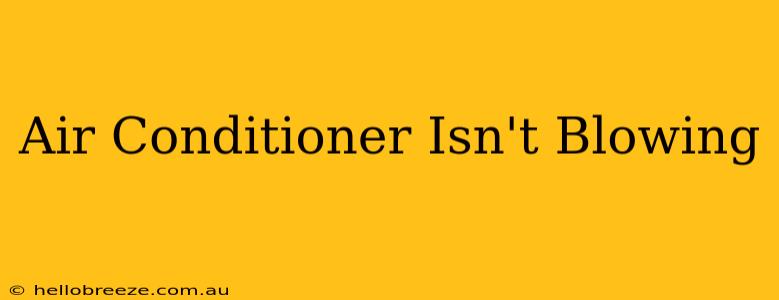Is your air conditioner refusing to blow cool air? A malfunctioning AC unit can be incredibly frustrating, especially during a heatwave. This comprehensive guide will walk you through the most common reasons why your AC isn't blowing cold air and provide troubleshooting steps to get you back to a comfortable temperature.
Common Reasons Why Your Air Conditioner Isn't Blowing Cold Air
Before you call a repair technician (which may be necessary!), let's explore the most frequent culprits behind a non-functional air conditioner. Many issues can be easily resolved with some basic troubleshooting.
1. Thermostat Troubles: The Control Center
Your thermostat is the brain of your AC system. A malfunctioning thermostat can prevent your unit from turning on or operating correctly.
- Check the Power: Ensure the thermostat is receiving power. Look for a tripped breaker or blown fuse in your electrical panel.
- Battery Check (for Battery-Powered Thermostats): If you have a battery-operated thermostat, replace the batteries. Weak batteries can cause intermittent operation or complete failure.
- Thermostat Settings: Double-check that the thermostat is set to "Cool" and that the temperature is set lower than the current room temperature. Make sure it's not accidentally set to "Off" or "Fan Only."
- Thermostat Calibration: Over time, thermostats can become inaccurate. If you suspect a calibration problem, consult your thermostat's manual for instructions on recalibrating.
2. Frozen Evaporator Coil: An Icy Problem
A frozen evaporator coil is a common problem that prevents cool air from circulating. This usually happens due to:
- Restricted Airflow: Check your air filter. A clogged or dirty filter restricts airflow, causing the evaporator coil to freeze. Replace the filter with a clean one.
- Refrigerant Leaks: Low refrigerant levels can also lead to freezing. This requires professional service as it involves handling refrigerants, which are hazardous. Do not attempt to fix this yourself.
- Dirty Condenser Coils: Clean condenser coils, located outside your home, are crucial for proper heat dissipation. Clean them with a coil cleaning brush or a garden hose (avoid high-pressure settings).
3. Refrigerant Issues: The Cooling Agent
Refrigerant is essential for cooling. A refrigerant leak results in insufficient cooling capacity, or no cooling at all.
- Listen for Hissing Sounds: A hissing sound near your AC unit might indicate a refrigerant leak. However, detecting refrigerant leaks requires specialized equipment and expertise. Don't try to find the leak yourself.
- Low Refrigerant Levels: Low refrigerant levels require professional attention. It's an indication of a leak that needs to be repaired and the system recharged.
4. Compressor Problems: The Heart of the System
The compressor is a vital part of your AC unit. If it fails, your AC unit won't work.
- Listen for Unusual Noises: Grinding, buzzing, or clicking sounds coming from the compressor are warning signs. These noises indicate potential compressor failure and require professional attention.
- Compressor Overload: A faulty compressor can overheat and trigger an overload protector. Check your breaker box for a tripped breaker related to the AC unit.
5. Electrical Issues: Power Problems
Ensure the AC unit has adequate power.
- Check the Breaker Box: A tripped breaker can stop your AC unit from working. Reset any tripped breakers related to your air conditioner.
- Check Wiring: Ensure there are no loose or damaged wires in your unit and to your system. If you notice damaged wires, it’s best to contact a qualified electrician.
When to Call an AC Repair Professional
While some issues, such as a dirty filter or tripped breaker, are easy fixes, other problems like refrigerant leaks or compressor failures require the expertise of a qualified HVAC technician. Don't hesitate to call a professional if:
- You suspect a refrigerant leak.
- You hear unusual noises from the compressor or other components.
- The problem persists after troubleshooting basic issues.
- You are uncomfortable working with electrical components or refrigerants.
Regular maintenance, including filter changes and annual inspections, can prevent many AC problems and extend the life of your unit. Staying proactive with your AC maintenance is the best way to ensure cool comfort all summer long.

